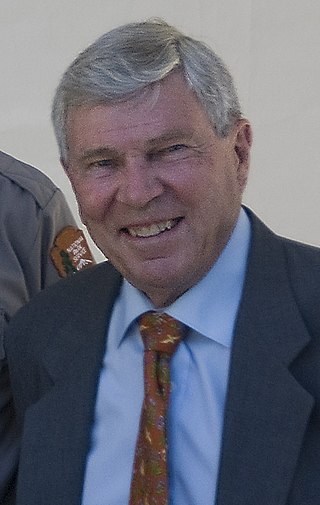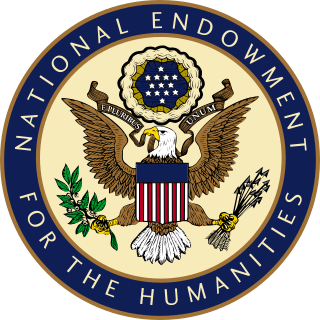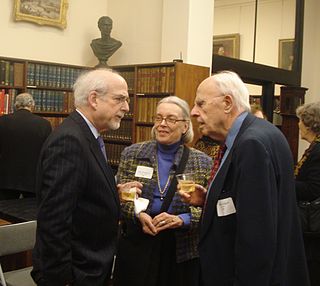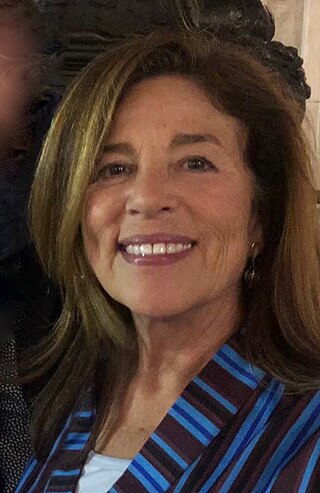Related Research Articles

James Munro McPherson is an American Civil War historian, and is the George Henry Davis '86 Professor Emeritus of United States History at Princeton University. He received the 1989 Pulitzer Prize for Battle Cry of Freedom: The Civil War Era. McPherson was the president of the American Historical Association in 2003.

The National Endowment for the Humanities (NEH) is an independent federal agency of the U.S. government, established by the National Foundation on the Arts and the Humanities Act of 1965, dedicated to supporting research, education, preservation, and public programs in the humanities. The NEH is housed at 400 7th St SW, Washington, D.C. From 1979 to 2014, NEH was at 1100 Pennsylvania Avenue, N.W., Washington, D.C. in the Nancy Hanks Center at the Old Post Office.

The Nebraska State Capitol is the seat of government for the U.S. state of Nebraska and is located in downtown Lincoln. Designed by New York architect Bertram Grosvenor Goodhue in 1920, it was constructed of Indiana limestone from 1922 to 1932. The capitol houses the primary executive and judicial offices of Nebraska and is home to the Nebraska Legislature—the only unicameral state legislature in the United States.
The President's Committee on the Arts and the Humanities (PCAH) was an advisory committee to the White House on cultural issues. It worked directly with the Administration and the three primary cultural agencies: the National Endowment for the Arts, National Endowment for the Humanities, and the Institute of Museum and Library Services, as well as other federal partners and the private sector, to address policy questions in the arts and humanities, to initiate and support public/private partnerships in those disciplines, and to recognize excellence in the field. Its core areas of focus were arts and humanities education, cultural exchange, and the creative economy.
Roy Rosenzweig Center for History and New Media (RRCHNM), formerly the Center for History and New Media (CHNM), is a research center specializing in digital history and information technology at George Mason University (GMU) in Fairfax County, Virginia. It was one of the first digital history centers in the world, established by Roy Rosenzweig in 1994 to use digital media and information technology to democratize history: to incorporate multiple voices, reach diverse audiences, and encourage popular participation in presenting and preserving the past. Its current director is T. Mills Kelly.

Arts and Humanities Focus Program, commonly referred to as Arts, is a focus program that specializes in art and the humanities. The school opened in 1999, and is housed in a historic bottling plant along the banks of Antelope Creek in Lincoln, Nebraska, United States.

Bruce Milan Cole was a longtime professor of art history at Indiana University, a Senior Fellow at the Ethics and Public Policy Center in Washington, D.C., a member of the Eisenhower Memorial Commission, and the eighth Chair of the National Endowment for the Humanities.
William Reynolds Ferris is an American author and scholar and former chairman of the National Endowment for the Humanities. With Judy Peiser he co-founded the Center for Southern Folklore in Memphis, Tennessee; he was the founding director of the Center for the Study of Southern Culture at the University of Mississippi, and is co-editor of The Encyclopedia of Southern Culture.
Public humanities is the work of engaging diverse publics in reflecting on heritage, traditions, and history, and the relevance of the humanities to the current conditions of civic and cultural life. Public humanities is often practiced within federal, state, nonprofit and community-based cultural organizations that engage people in conversations, facilitate and present lectures, exhibitions, performances and other programs for the general public on topics such as history, philosophy, popular culture and the arts. Public Humanities also exists within universities, as a collaborative enterprise between communities and faculty, staff, and students.

Judith Dupré is a writer, structural historian, and public speaker. She is the New York Times bestselling author of several works of narrative nonfiction on art, design, and architecture. She has been described as “a scholar with a novelist’s eye for detail and a journalist’s easy style.”
The Missouri Humanities Council, "Missouri Humanities" (MH) is a 501(c)(3), non-profit organization that was created in 1971 under authorizing legislation from the U.S. Congress to serve as one of the 56 state and territorial humanities councils that are affiliated with the National Endowment for the Humanities (NEH).

Spark Media is an American independent multimedia and documentary production house based in Washington, D.C., United States.
The Jefferson Lecture in the Humanities is an honorary lecture series established in 1972 by the National Endowment for the Humanities (NEH). According to the NEH, the Lecture is "the highest honor the federal government confers for distinguished intellectual achievement in the humanities."
The Illinois Newspaper Project (INP) began as part of the United States Newspaper Program (USNP), a cooperative effort between the states and the federal government designed to catalog and preserve on microfilm the nation's historic newspaper heritage. The USNP was funded by the National Endowment for the Humanities (NEH) and administered by the Library of Congress, who are currently funding the National Digital Newspaper Program (NDNP), of which the INP is also a part.
Indiana Humanities is a nonprofit organization based in Indianapolis that funds and produces public humanities programming throughout the state of Indiana. It is one of 56 humanities councils in the United States and is affiliated with the National Endowment for the Humanities.

The Center for Public History and Digital Humanities is a digital humanities center in Cleveland, Ohio, based in the Department of History at Cleveland State University.

Carole McAlpine Watson is an American academic who served twice as acting Chair of the National Endowment for the Humanities, first in 2009 and again in 2013 to 2014. Watson studied African American literature and authored Her Prologue, a scholarly bibliography of novels by African American women published between 1859 and 1965.
The Mississippi Humanities Council is a private not-for-profit corporation funded by the United States Congress and the National Endowment for the Humanities. Its mission is "to provide public programs in traditional liberal arts disciplines to serve nonprofit groups in Mississippi." The Mississippi Humanities Council belongs to a group of 55 other such state and territorial humanities councils that receive Federal support. The MHC was founded in 1972.

The Louisiana Endowment for the Humanities is a nonprofit organization dedicated to furthering the education of residents of the state of Louisiana. In its mission, the Louisiana Endowment for the Humanities pledges to provide access to and promote an appreciation of the history of Louisiana and its literary and cultural history. It was founded in 1972 as a result of initial funding by the National Endowment for the Humanities.
References
- ↑ "State Humanities Councils". NEH Website. Retrieved December 12, 2013.
- 1 2 "About Us". HN Website. Retrieved 2013-12-17.
- ↑ "Humanities Nebraska- new name, new website". Beatrice Daily Sun. March 25, 2013. pp. A5.
- ↑ "About Us". HN Website. Retrieved December 12, 2013.
- ↑ "Board of Directors". HN Website. Retrieved December 12, 2013.
- ↑ Sommerich, Chris (May 11, 2012), "Chau-tauq-WHAT? Bringing a Late 19th- to Early 20th-Century Cultural Phenomenon into Modern Times", Prairie Fire, retrieved November 20, 2015
- ↑ "Chautauqua". HN Website. Retrieved 2013-12-17.
- ↑ "Chautauqua days are set". Lincoln Journal Star . June 16, 2013. pp. D10.
- ↑ "Governor's Lecture in the Humanities". HN Website. Retrieved December 12, 2013.
- ↑ Pluhacek, Zach (April 15, 2010), "Nebraska Humanities Council director Hood to retire", Lincoln Journal Star , retrieved December 12, 2013
- ↑ "Humanities Council seeks Sower Award nominations". Lincoln Journal Star . April 12, 2011. Retrieved December 19, 2013.
- ↑ "Sower Award in the Humanities". HN Website. Retrieved December 19, 2013.
- ↑ "Capitol Forum on America's Future". Nebraska Secretary of State Website. Retrieved December 12, 2013.
- ↑ "Capitol Forum on America's Future". Humanities Nebraska Website. Retrieved December 12, 2013.
- ↑ "Prime Time Family Reading Time". Humanities Nebraska Website. Retrieved December 12, 2013.
- ↑ "Reading program receives award". Lincoln Journal Star . April 25, 2011. pp. C2.
- ↑ "Museum on Main Street". Humanities Nebraska Website. Retrieved December 12, 2013.
- ↑ "About Museum on Main Street". Smithsonian Institution Traveling Exhibition Service Website. Retrieved December 12, 2013.
- ↑ "Smithsonian "Hometown Teams" exhibit to tour Nebraska towns". Lincoln Journal Star . October 20, 2013. pp. D6.
- ↑ "Nebraska State Poet". HN Website. Retrieved 2013-12-17.
- ↑ "Grants". HN Website. Retrieved 2013-12-17.
- ↑ Neb. Rev. Stat. § 82-330
- ↑ Andrew R. L. Cayton; Richard Sisson; Chris Zacher (8 November 2006). The American Midwest: An Interpretive Encyclopedia. Indiana University Press. p. 627. ISBN 978-0-253-00349-2.